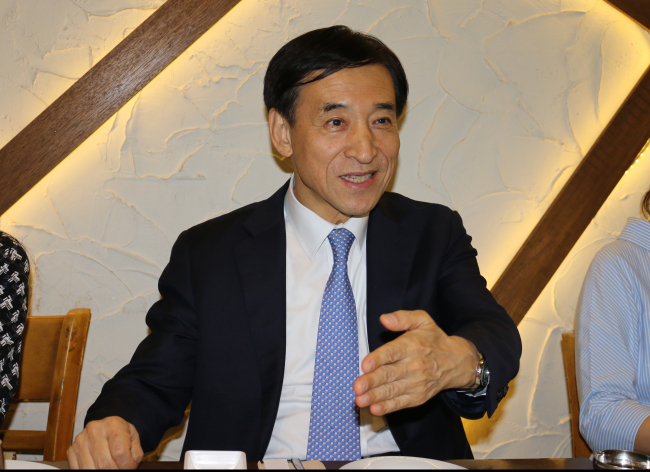South Korea will push to revive a currency swap deal with Japan that was suspended over diplomatic feuds, Bank of Korea Gov. Lee Ju-yeol has said.
During a news conference on the sidelines of a regional forum in Manila on Friday, Lee expressed expectations that the two sides will start negotiations in the near future.
 |
BOK Governor Lee Ju-yeol (Yonhap) |
In January last year, the Tokyo government broke off the negotiations with Seoul to reopen the currency swap agreement, citing Seoul's move to let a statue symbolizing the victims of Japan's wartime sexual slavery be installed near its consulate in the southern port city of Busan.
In August 2016, the two countries had agreed to resume the talks after a US$10 billion bilateral currency swap deal that had been maintained since 2001 expired in February 2015.
"When the bilateral currency swap arrangement was extended with China, the THAAD controversy was underway, but we ruled out any political discussions," he said during his meeting with reporters on the sidelines of the 21st meeting of the Association of Southeast Asian Nations Plus Three (ASEAN Plus Three) finance ministers and central bank governors in Manila.
"Our consistent stance is that a currency swap deal should be approached in terms of economic cooperation. We will make efforts for that."
A currency swap is a tool for defending against financial turmoil by allowing a country beset by a liquidity crunch to borrow money from others with its own currency.
In addition, the BOK chief hinted at a hike in the country's key rate when conditions are right.
"If our economy maintains a 3 percent growth rate with a 2 percent inflation rate and the current base rate remains unchanged, a financial imbalance will grow," Lee said. "The rate should be raised when it can be."
Market watchers have anticipated that the BOK will raise the key rate at a faster-than-expected pace, given the U.S. Fed's scheduled rate hikes.
Currently, South Korea's base rate is lower than that of the United States for the first time in more than 10 years following a rate hike by the Federal Reserve in March. (Yonhap)








